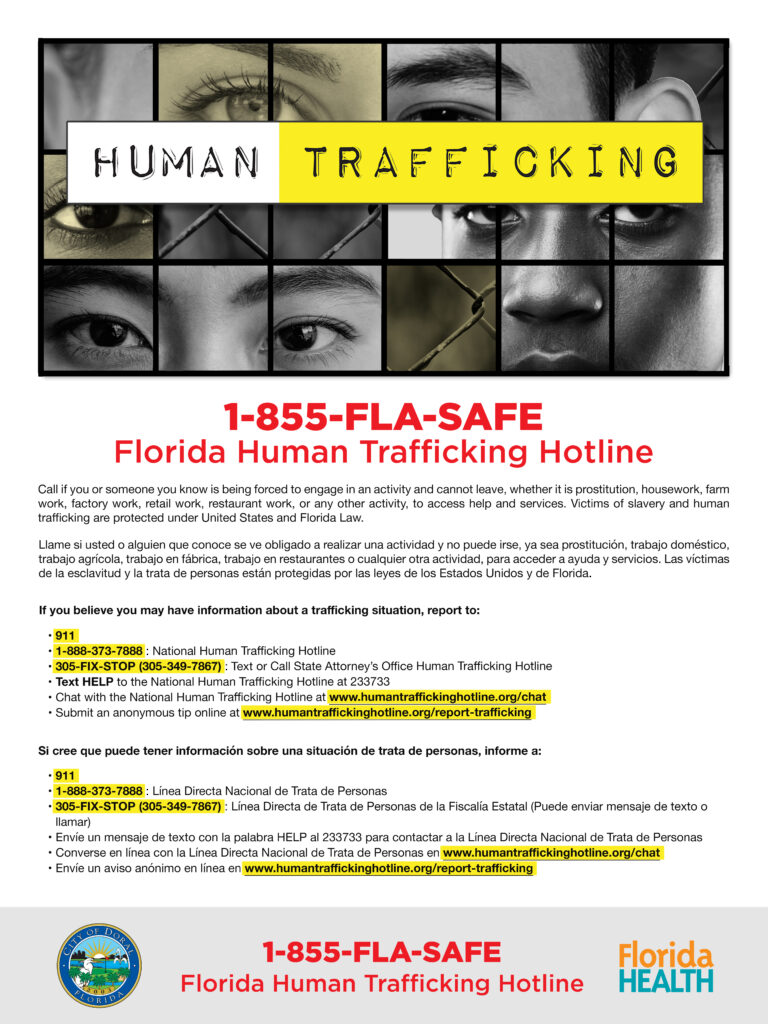Doral businesses to display signs against human trafficking
An information campaign starts in February.
By: Diana Bello Aristizábal
Human trafficking is the transfer of human beings from one place to another within the borders of the same country or abroad for the purposes of exploitation. It is currently one of the most serious issues for humanity and affects, mostly but not exclusively, women and underage individuals. Due to its enormous implications, City of Doral urges businesses to do their part.
Businesses can help fight this scourge, that according to the United Nations Office on Drugs and Crime harms 2.5 million people in the world, of which 15 to 20% are children, by complying with ordinance No.2024-30 adopted by the city on Oct. 23, 2024. The ordinance requires specific establishments to display human trafficking public awareness signs at their place of business.
To follow through with the ordinance, the issue was brought back to the table at the Jan. 15 council meeting. In it, the design of the signaling was presented, including colors, graphics and verbiage, and everything was laid out to start an outreach campaign throughout the city with establishments that can be subjected to this crime.

“We made specific recommendations to the poster and starting in February it’s ready to be downloaded and printed from the website,” says Rafael Pineyro, City of Doral councilman and main sponsor of the ordinance.
Still, businesses will have a grace period to dive into how to properly comply with the ordinance before being subjected to a fine of up to $500 for violating the measure. “We’re talking about a 90-day period in which we will make sure everyone is informed that they have to comply with this ordinance. After that time, they all should be displaying the signs,” says Pineyro.
It should be noted that human trafficking is a form of modern-day slavery that involves the exploitation of a person for commercial sex or labor using force, fraud and coercion. This means that although many victims are forced to work in prostitution or the sexual entertainment industry, trafficking is also connected to housekeeping, hospitality, farming and factory production, among many other fields.
That’s why the ordinance covers a wide range of businesses, including restaurants, alcoholic beverage establishments, night clubs or any other entertainment or food service establishments; and public lodging establishments classified as hotels, motels, transient and non-transient apartments, bed and breakfast inns, timeshare projects or vacation rentals.
In addition, also to be included are specialty salons performing nails or any other beauty services; businesses or establishments that offer massage or bodywork services for compensation that is not owned by a health care practitioner regulated pursuant to the law; and urgent care centers, facilities or clinics that provide urgent care medicine or services.
Businesses that fall into those categories will be required to display signs in a conspicuous location clearly visible to employees and patrons where other labor and employment signs are displayed. “The Code Compliance Department will be monitoring and ensuring that they comply with this ordinance,” explains Rafael Pineyro.
According to councilman Pineyro, adopting this ordinance is an important step for the city, which seeks to adhere with human trafficking House Bill 7063 signed by Governor Ron DeSantis in May 2024, because “it will spark for the first time true public awareness around the issue.”
“Miami-Dade County, due to its diversity, is a place where many of these cases end up being resolved or where many cases even begin. We are creating an educational campaign so that people know where to go if they are victims of this crime.”
The signs will be written in both Spanish and English, will clarify that human trafficking refers to any activity that a person is forced to engage in without the possibility of leaving, that victims of slavery and human trafficking are protected under United States and Florida law, and will end providing several contact numbers and website links.
If you are a business owner and have questions about the ordinance, please contact the Code Compliance Department by sending an email to codecompliance@cityofdoral.com or calling (305) 593-6680.


